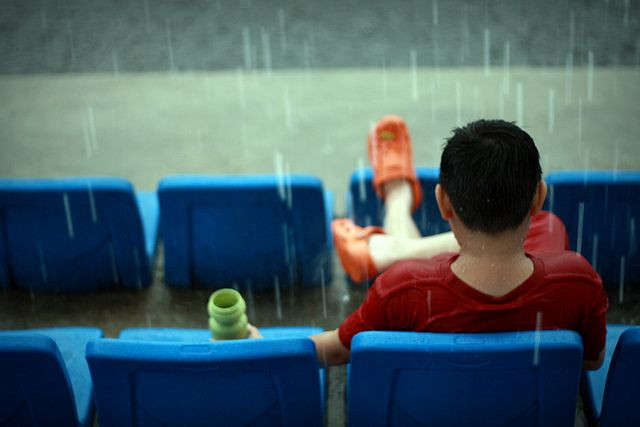Parents Blind To Childhood Obesity Say Their Kids Are 'Very Healthy' A Third Of The Time

She’s not just saying it because she’s your mom. Parents, bless their innocent souls, love to romanticize their kids’ personal feats, be they academic, athletic, or aesthetic. Face it, your kids are better-looking, faster, smarter, and overall better than anyone else’s kids — not always a healthy outlook, especially as childhood obesity continues to soar.
Not to be a buzzkill, but keeping your kids healthy is everyone’s problem. In the United States alone, children are twice as obese as they were 30 years ago and adolescents are more than four times as obese. Nearly one in five children was overweight in 2012, charting a dangerous path for future adults to burden the nation’s health care system. But if the current research is anything to go by, many parents are blind to this fact, seeing their own children as immune from obesity’s health risks through the sheer power of ignorance and love.
"Parents have a hard time changing their child's dietary and physical activity behaviors," said Dr. Kyung Rhee, lead author of a recent study into parent-child obesity dynamics. An assistant adjunct professor at the University of California, San Diego School of Medicine, Rhee is interested in learning how kids come to become obese and why they stay that way. Part of the answer, she and her colleagues are finding, involves how their parents see their children’s weight.
The researchers’ latest study is based on a survey of 202 parents whose children were enrolled in an obesity clinic at the Hasbro Children's Hospital in Providence, R.I. The survey asked parents about their willingness to take concrete steps toward improving their children’s health, including listening to pediatricians’ advice to get at least one hour of activity each day and to eat healthy. The children ranged in age from 5 to 20 years old, with an average age of 13.8 years. More than two-thirds were female, and almost all (94 percent) were classified as clinically obese.
Parents’ willingness was lukewarm. Even though most of the children had been referred to the obesity clinic by their doctor, 31.4 percent of the parents reported seeing their children’s health as excellent or very good, and 28 percent saw no problems with their kids’ health whatsoever. Just over 41 percent of parents reported they were increasing their child's involvement in active play, sports, dancing, or even walking.
This isn’t the first time parents have been found to overestimate their children’s health. Earlier this year, researchers from the University of Nebraska, Lincoln, found more than half of parents studied couldn’t recognize a problem with their kids’ weight. The tipping point, the team found, came around age 5, when parents stopped seeing ordinary fat tissue as temporary “baby fat.”
As you may expect, heavier parents encouraged less exercise and healthy eating compared to parents who maintained a healthy weight and worked out more often. Even parents who merely talked about their own weight with their physician were more likely to be in the "action stage of change" with their child's diet. Race and ethnicity, income, and education levels all had nothing to do with the outcome, the researchers say.
Early intervention may be the most effective way to reduce a child’s risk. Parents who discussed healthy lifestyle choices with their kids before the kids turned 14 left a stronger impression than other parents, who resolved themselves to have a chat later in the kids’ lives. Physical activity (PA), in particular, stood out as lacking among the study’s participants. While parents were more comfortable talking about eating right, getting up from a screen often failed to enter the conversation.
“Training health care providers to address PA readiness and be aware of factors influencing dietary and PA readiness may result in more effective conversations with parents and improve behavior change efforts for pediatric weight loss,” the researchers concluded.
Source: Rhee K, McEachern R, Jelalian E. Parent Readiness to Change Differs for Overweight Child Dietary and Physical Activity Behaviors. Journal of the Academy of Nutrition and Dietetics. 2014.
Published by Medicaldaily.com



























